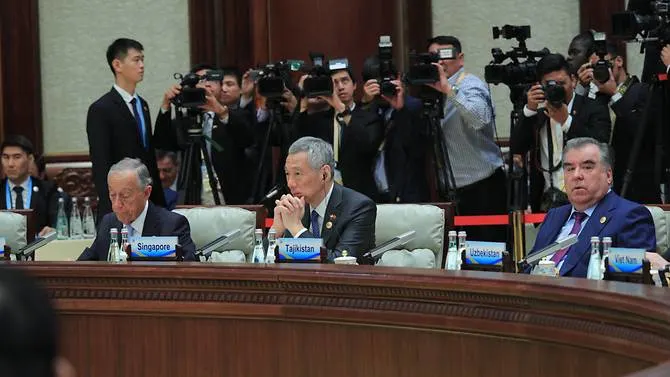Belt and Road can go beyond physical infrastructure, take transparent approach in next phase: PM Lee
27 April, 2019

China’s Belt and Road Initiative (BRI) can move beyond the development of physical infrastructure and traditional bilateral partnerships, while taking a transparent and market-driven approach in its next phase.
These were suggested by Singapore’s Prime Minister Lee Hsien Loong on Saturday (Apr 27) as he spoke at a leaders’ roundtable on the final day of the second Belt and Road Forum. The session chaired by Chinese President Xi Jinping was held at the Yanqi Lake Convention Centre in northeastern Beijing.
The BRI, first mooted by Mr Xi in 2013, is an ambitious infrastructure plan by China to rebuild the old Silk Road to connect the world’s biggest economy with other parts of Asia, Europe and beyond.
Now that it is exporting both capital and expertise, China’s overseas direct investment has exceeded inbound foreign direct investment since 2015 – a “significant turning point”, according to Mr Lee.
“China is helping to meet the infrastructure deficit of developing countries in the region, estimated by the Asian Development Bank to be about US$26 trillion from now to 2030,” he added.
“New roads, ports and railways built under the BRI have enhanced physical connectivity between cities and countries, and in time should catalyse economic growth.”
For the next phase, Mr Lee said it will be useful to consider how to maximise the long-term benefits of the BRI beyond just improving physical infrastructure.
One way is to help developing countries build up their own capabilities, be it by fostering more local talent, facilitating further technology transfer and involving more local businesses.
Mr Lee said doing so will not only improve the quality and sustainability of the infrastructure projects, but also give local parties a greater stake in the projects’ success.
The BRI should also go beyond traditional bilateral models of cooperation, with projects not having to be limited to “hub-and-spoke arrangements with China”.
“China can partner other countries on projects in third countries,” he said.
“This can bring together a wider range of capabilities and resources, open new doors to projects which may otherwise not be feasible, and enhance trade and economic cooperation not just between other countries and China but among other countries too,” he added.
Moving forward, the Chinese-led mega infrastructure initiative should "take an inclusive, transparent and market-driven approach”, Mr Lee said.
“Connectivity projects should be economically viable and financially sound. This will improve accountability and risk management, increase the projects’ overall chances of success and inspire greater confidence in future projects."
As it developed, China’s share of global gross domestic product has grown, alongside its international influence. This has shifted the world's strategic balance, said Mr Lee.
"How China performs its prominent global role and how the international community adjusts to China’s growing influence, will determine whether all of us, and all our countries, can enjoy continued peace and prosperity,” he added.
“China naturally wishes to occupy a place in regional and global affairs that is commensurate with its strengths and influence. Other countries expect China to strengthen its commitments and contributions to the global system.”
And the BRI is a “good platform” for China to work together with other countries on these objectives, said the Prime Minister.
Now in its sixth year, the BRI has helped deepen China’s linkages with other countries.
He added: “A prospering region with China fully integrated together by an open regional cooperation infrastructure will reinforce the open, rules-based international order and multilateral trading system, which has benefited all of us.”
Singapore sees the BRI as benefiting both China and the world, he said.
This is why the Southeast Asian country has been an “early and strong supporter” of the BRI and is working with China on areas, such as promoting financial and infrastructure connectivity.
"The BRI can contribute much to a peaceful, orderly shift in the global order, and support China’s constructive international role commensurate with its size and potential," concluded Mr Lee.
Earlier on Saturday, Mr Lee met Chile’s President Sebastian Pinera and both leaders reaffirmed the warm and longstanding relations between Singapore and Chile, said a statement from the Prime Minister's Office (PMO).
They also welcomed the commemorative activities lined up to celebrate the 40th anniversary of diplomatic ties this year.
Both leaders reaffirmed the importance of the Pacific Alliance-Singapore free trade agreement in strengthening trade and investment flows between both countries.
Urban planning and population issues were also on the agenda during the meeting. Mr Lee and Mr Pinera agreed to further enhance cooperation in the areas of digital trade and smart cities, including agreements to promote digital trade and connectivity.
Mr Lee also welcomed Chile’s efforts to promote inter-regional cooperation and its commitment to deepen relations with ASEAN.
